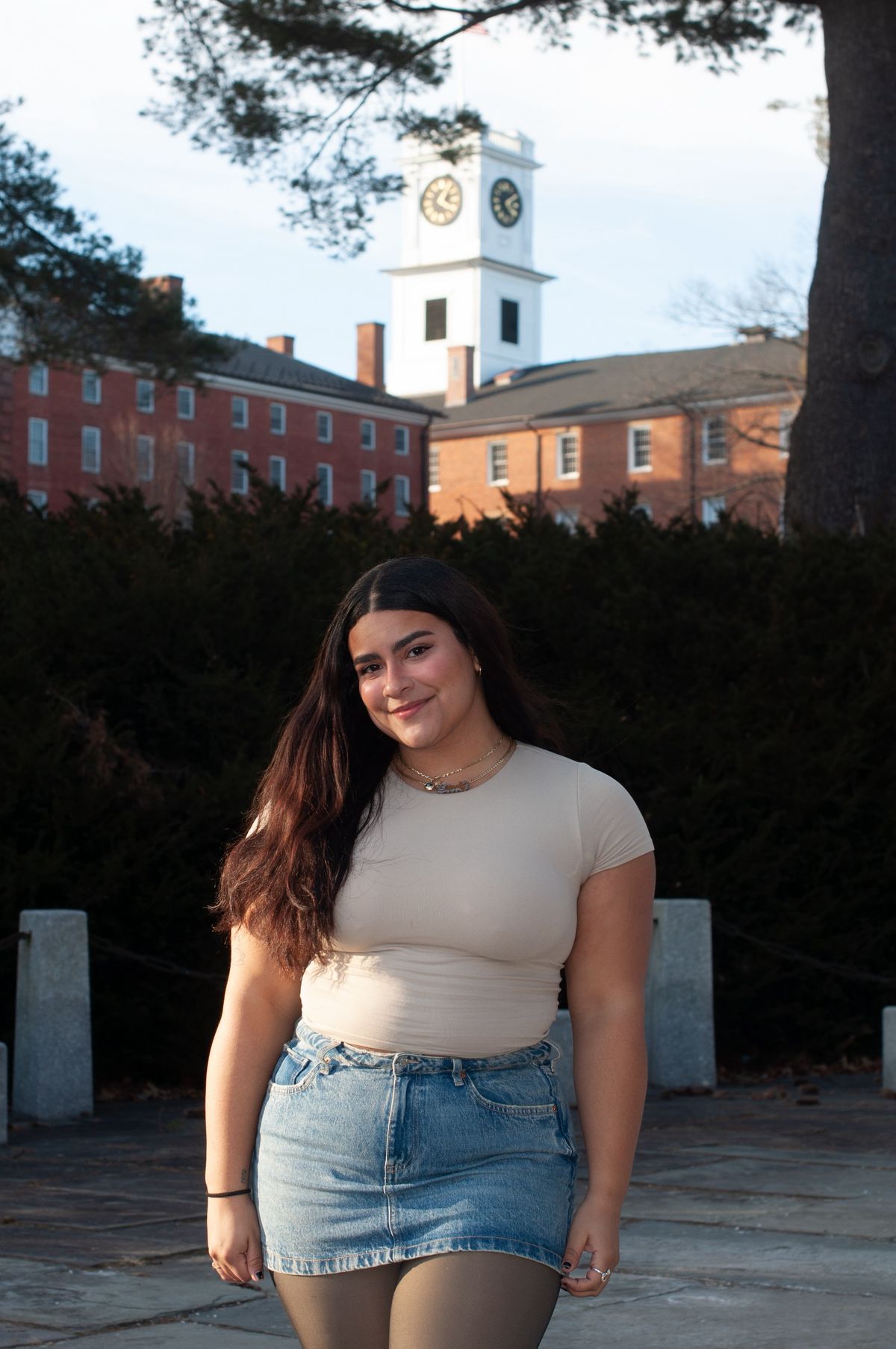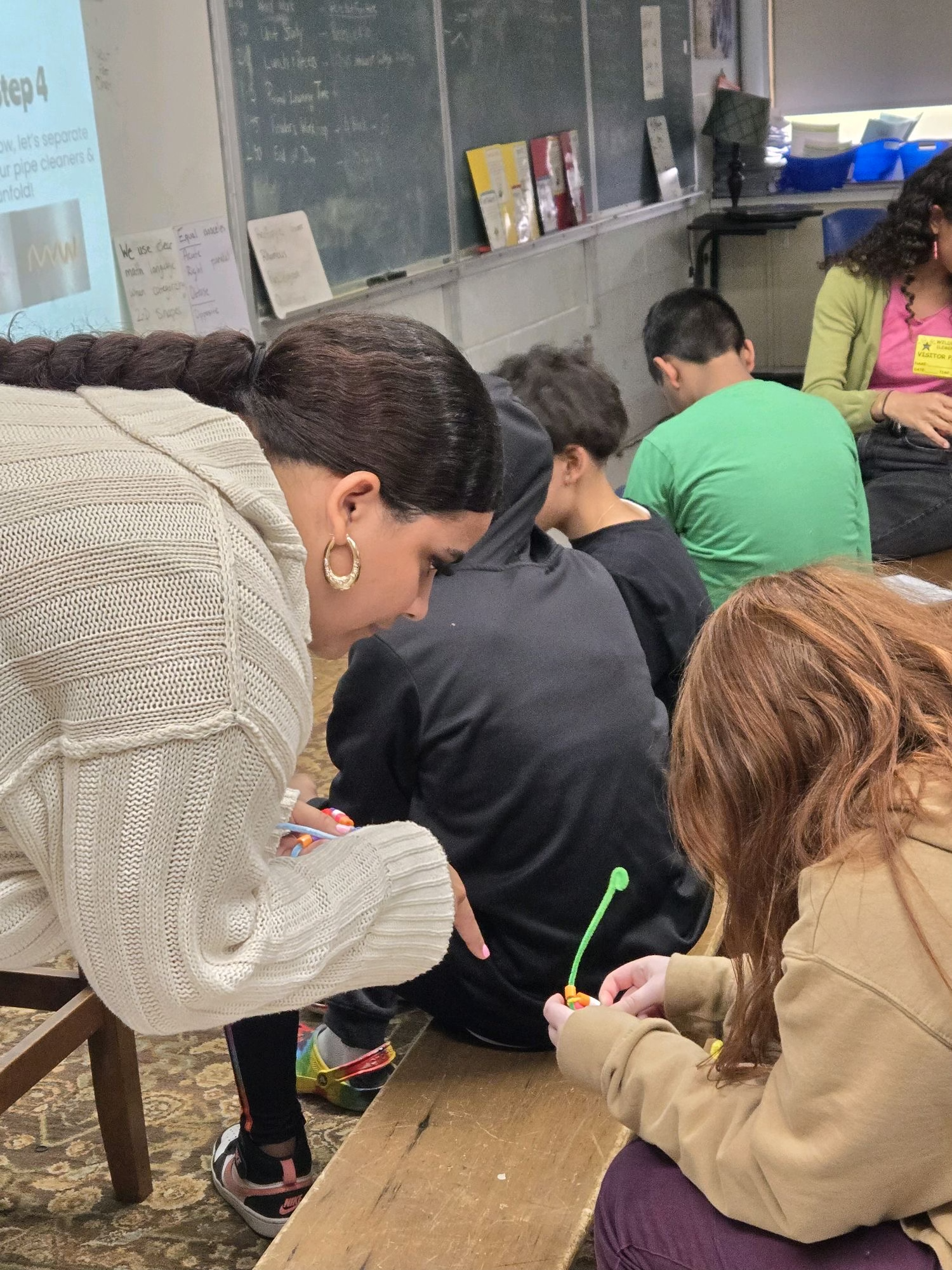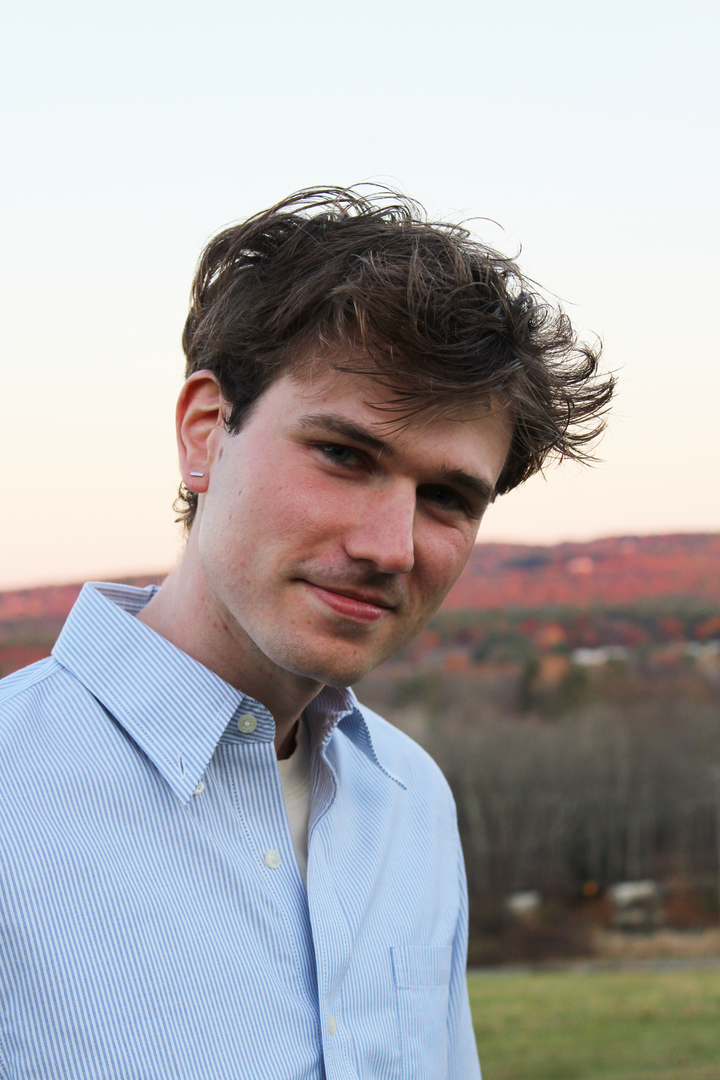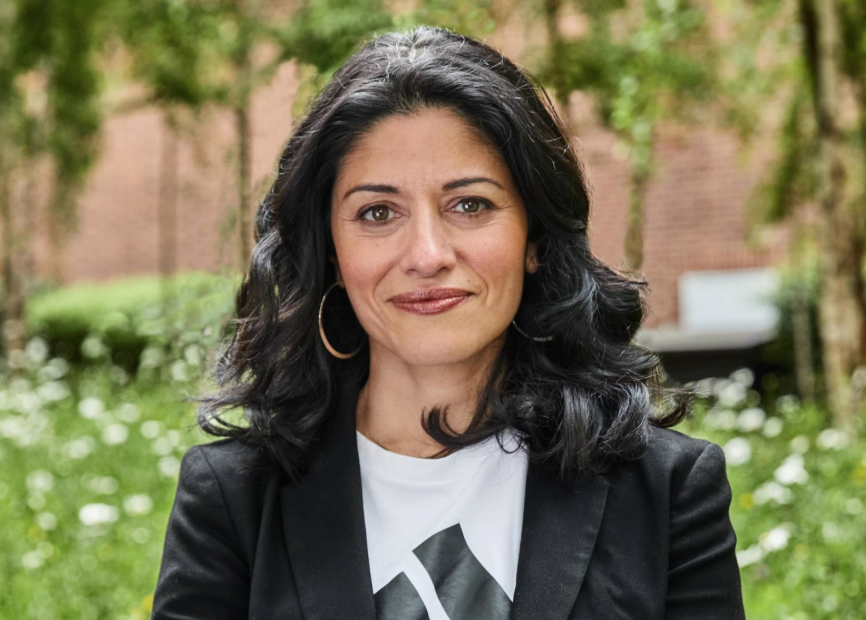Cindy Rosario: Creating Community Through Deep Engagement
Cindy Rosario’s time at Amherst has been shaped by a deep commitment to fostering community and interpersonal growth. While she has a remarkable work ethic, her true power stems from enriching the lives of others.

Chances are, you don’t know Cindy Rosario ’24 from just one place. Whether you’ve heard her speak passionately and insightfully in a psychology class, danced to her meticulously crafted playlist at a La Causa function, implemented her advice about your resume at the Loeb Center, or received a steaming plate of pasta from her at Pasta y Basta, Rosario’s deep commitment to fostering community and interpersonal growth, has left a mark on every corner of the Amherst community.
Over the course of my conversation with Rosario, sitting in the late-afternoon sun outside of Frost Cafe, it became clear that Rosario’s unrelenting dedication and engagement stems from her genuine care for those around her. As Rosario’s former roommate and best friend since high school Enely Turbi Alvarez ’24 attests, “Cindy’s taught me a lot about how to be in community with people, how to help them when they didn’t even know that they needed something. I’ve grown so much by knowing her and by being loved by her.”
Extremely hardworking and committed to ensuring positive change, specifically in educational settings, Rosario embodies Amherst’s motto: Terras Irradient, or “let them give light to the world.”
“As a professor, I often think about students and say to myself, ‘I hope my kids are like them.’ And that’s how I feel about Cindy,” said Chair of American Studies Leah Schmalzbauer, with whom Rosario has taken four courses and currently works as a teaching assistant. “I hope my daughter has her confidence, her discipline, and her deep respect for and commitment to her family and her community.”
The Journey to Amherst
While Rosario was born in Washington Heights, New York, and later attended school there, she spent a majority of her early childhood in the Dominican Republic (DR). “I moved to the DR when I was six months old to live with my grandparents,” Rosario explained. “My parents were having a hard time making ends meet, so I stayed with my grandparents until I was five. Spanish was my first language.”
Upon returning to the United States, Rosario was still able to maintain a connection to the language and culture she’d grown up with. “Washington Heights is a very Dominican neighborhood,” Rosario said. “I remember always being surrounded by people who looked like me and spoke Spanish.”
Rosario remained in Washington Heights for the beginning of her education, first attending an elementary school that was right across the street from her mom’s workplace followed by middle school at the Equity Project Charter School. When ninth grade rolled around, Rosario received a scholarship through a community-based organization to attend Riverdale Country School, a private high school in the Bronx. The relationships Rosario formed at this institution partially encouraged her commitment to Amherst. “I visited Amherst once, and I visited with Enely, my best friend from high school.” Rosario explained. “Enely knew that she loved Amherst, and so she applied early decision. I applied regular decision because I had other schools that were also a good fit, but once my acceptance came, I couldn’t stop imagining myself on the Amherst campus and as a part of the community.” While the fact that Enely was attending Amherst was “definitely in the pros column” when Rosario was making her decision, she was also especially drawn to the open curriculum. According to Rosario, she really loved the idea of getting to explore a variety of diverse subjects because, “I knew the passions and academic interests I had, but I didn’t really know what I wanted to do after college.”
However, Rosario’s journey to Amherst was not without its difficulties. “My parents don’t really speak English, so my college process was a lot of translating and not feeling like I was really able to explain to them what a small liberal arts college was,” she said. Further, Rosario was remote during her first year at Amherst because of Covid, meaning she lived at home in New York and attended her classes on Zoom. “The first semester, we were all remote, even if you were on campus. The second semester, they started letting people go into classrooms with social distancing, and so some of my professors used to project me on the board for everyone to see,” explained Rosario. “I felt so hypervisible, and it was definitely a little weird. But overall, it was fine.”
Despite not spending her first year on campus, Rosario looks back at her transition from New York to small-town Amherst during her sophomore year with a smile. “I came onto campus with a car, which was really nice because I was able to work at the Foot Locker at the Holyoke Mall. It was great to be mobile and make friends outside of Amherst; interacting with my co-workers who lived in Chicopee or Holyoke made our small community feel less like a bubble, and made the transition to Amherst much easier.” Rosario further cites Turbi Alvarez and her other friends as being crucial to helping her feel fulfilled at Amherst, commenting that “a lot of my friends happened to be from New York, so it was just like bringing home with me.”
Rosario’s on-campus extracurricular involvements were another important way that she made Amherst feel like home. La Causa, Amherst’s student-led Latinx affinity group, has been particularly important for Rosario during her time at Amherst. As the social chair of this organization during her junior year, she loved “being able to hold space for students to come together to listen to their favorite music and eat their favorite foods.” As Rosario explained, “I talk a lot about being excited to go back home, eat my mom’s food, and speak Spanish all the time. I have really limited opportunities to do that here at Amherst, but La Causa always gave me the space to experience that. I’m really appreciative of that community.”
While Rosario played travel volleyball in high school, her senior season got cut short because of Covid. After not playing for two years, Rosario came to Amherst and joined the club volleyball team. “It was a really important part of her life, and so it’s been awesome that she’s still able to do something she genuinely loves,” Turbo Alvarez explained. As both a coach and captain of the team, Rosario found that leading four practices a week, teaching volleyball techniques, and organizing games with other colleges not only engaged her athletic and leadership skills, but also encouraged some of her closest friendships. “I cried during our senior send off,” said Rosario. “Being a part of this team has been such an incredible experience — some of my teammates are my best friends, and I’m really gonna miss them.”
Rosario’s engagement with the Amherst community doesn’t end with contributions to student organizations — she is also a server at the restaurant Pasta y Basta in downtown Amherst, a student assistant at the Wilson Admission Center, and a Peer Career Advisor at the Loeb Center. “Rosario has such a great work ethic — she is always working so hard, and that’s something I really admire about her,” remarked Turbi Alvarez. When speaking of her many jobs, Rosario recognized, “It’s work, but it’s also a way I’ve been able to get integrated into the community. I feel like I’m really able to reach different parts of the community: with my job in admissions it’s pre-Amherst, and then with my job at the Loeb Center I get to interact with a lot of underclassmen, which is something I don’t really get the chance to do as much now as a senior.”
Making a Difference Through Academics
Despite pressure from her parents to go to medical school, Rosario has known she wanted to pursue psychology since she took a psychology class in high school. However, Rosario also discovered new passions upon arriving at Amherst. “I wasn’t able to take “Introduction to Psychology” during my first semester, and so I took a ton of Sociology and LLAS courses instead. Throughout the semester, I noticed that I was really interested in educational inequalities.” Amherst created the education studies major during Rosario’s sophomore year, and, as she continued to take classes in this subject, Rosario eventually declared her double major in psychology and education studies.
Rosario has found that, at Amherst, she’s been able to merge her passions for psychology and education. “I remember taking “Developmental Psychology” and learning about how young kids learn and being really interested in that,” said Rosario. “So after I took that course, I took “Childhood and Adolescence,” and these classes actually fulfilled some requirements for the education studies major.” As Rosario explained, “There are some things that I’ll learn in my Social Psychology class that I'll use when talking about education policies and pedagogy, particularly about how kids are processing information and how they might feel supported or neglected in a classroom. It’s been really cool that psychology plays into the kind of pedagogy I’m interested in.”
Rosario’s deep commitment to her intellectual interests has made a tremendous impact on the experiences of both her peers and professors. “Cindy has such a great work ethic; she’s super organized, super smart, incredibly insightful, and not afraid to say what she’s thinking, even if it goes against the grain,” said Schmalzbauer. “She’s really great at putting her own experiences into conversation with what we’re studying in ways that are really powerful and that invite other people to do the same. And that’s when you really get this deep, engaged classroom community where people aren’t just looking abstractly at the world, but are really considering their own position within what we're talking about.”
Rosario’s education studies capstone project, which was on restorative justice and mental health in schools, further allowed her to impact others while uniting her two passions. Rosario worked on this project last semester in her Advanced Research Seminar, but her efforts actually began over the summer in her local community.
“Last summer I interned in the social work office at the Equity Project Charter School, which is where I went to middle school,” said Rosario. “My task was to create a restorative justice implementation guide.” As Rosario explained, restorative justice consists in moving away from punitive discipline practices and towards methods that holistically repair harm. Along with the implementation guide, Rosario also created different social emotional learning curricula for each middle school grade level. “I found myself really leaning on my knowledge from both majors in that project,” reflected Rosario. “My research was not only education research, but it was also reading a lot of psychological studies.”
After the summer, the Equity Project Charter School implemented Rosario’s work and provided feedback on its effectiveness, which she then revised to serve as her Capstone Project. Upon finishing corrections in the fall, Rosario sent her edited guide to the Equity Project Charter School, and they have been using it ever since. “I’m happy that I was able to work within the system and create pathways for harmful disciplinary practices to be deconstructed,” said Rosario. “I have memories of getting in trouble for talking in class, but I was talking because I was really interested in something that was going on, and not because I was disengaged. When I was working on my project, I was thinking about the kids like me who love to talk but are also really bright and intelligent and curious.”

Rosario’s commitment to promoting equity and emotional growth in educational settings has also extended to the Amherst community. As a Teaching Assistant for the Psychology and Education Studies course “Intergroup Dialogue on Race,” co-taught by Schmalzbauer and Manwell Family Professor of Life Sciences Allen Hart, Rosario helped students understand the complex role that race and social inequality play in their daily lives. “The seminar met once a week for three hours: we would get really deep in class discussions — like really deep,” said Rosario. “I’ve been able to lead discussions, grade work, and implement my own ideas. I’ve been able to step into the shoes of an educator, in a way, right before I graduate.”
“She’s such an organic educator,” reflected Schmalzbauer. “She’s so skilled in having hard dialogues, making connections, and bringing people into difficult conversations. And she knows how to do so in a way that doesn’t call people out or make them feel uncomfortable. People often run away from discussions of race because it’s too hard to talk about, but Cindy creates a space where people don’t have these fears.”
Communities Old and New
Next fall, Rosario will be returning to New York to get her master’s degree in social work at the Columbia School of Social Work. “It’s all coming full circle,” Rosario remarked. In fact, Rosario has already spoken with the Equity Project Charter School and is likely going to join their social work team upon completing her masters. “It would be really great to re-enter that community that shaped me, not as an intern or a student but as a colleague, as someone who can really make change.”
While no one who knows Rosario has any doubt that she is going to change the world, she has already left a deep, unmistakable mark on the Amherst community. Through her hard work, passion, and commitment to the wellbeing of others, Rosario has impacted the lives of all community members for the better. I can’t wait to see all of the amazing things she is going to do in the future, and I know Amherst will miss her dearly.





Comments ()